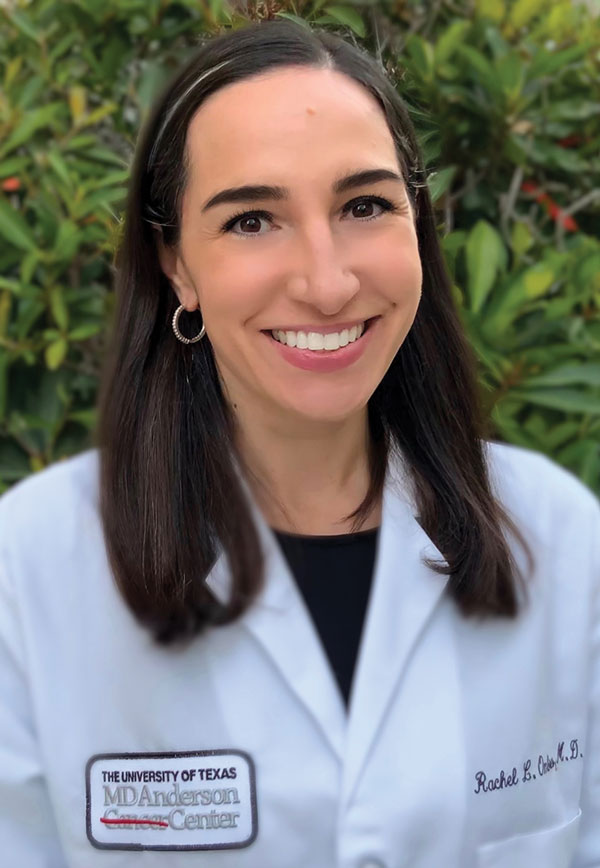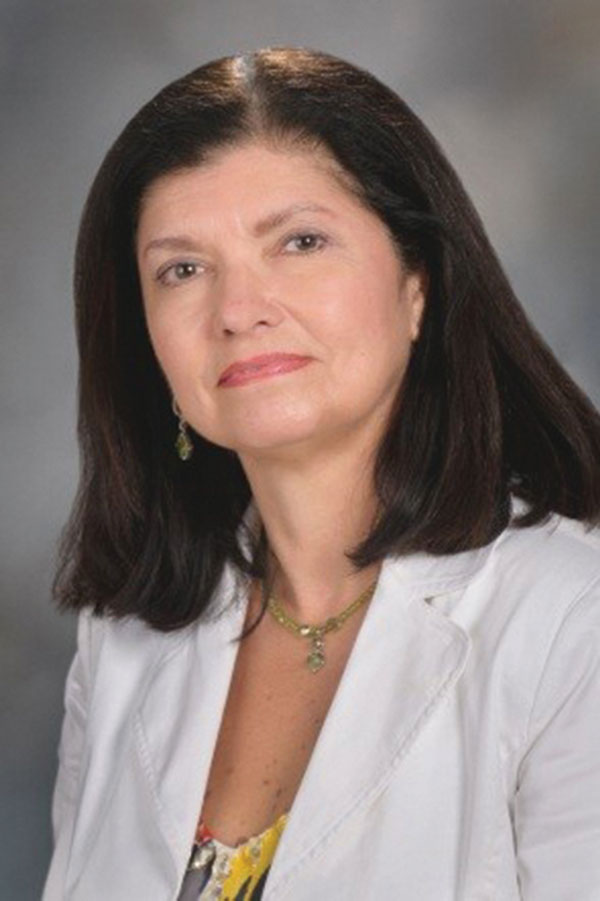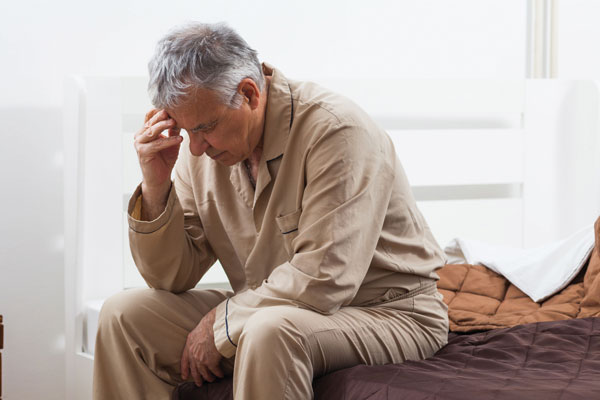Worn Down by Cancer-Related Fatigue?
We’ve Got the Answers You’ve Been Looking For
by Rachel Ombres, MD, and Carmen Escalante, MD
FATIGUE is one of the most distressing side effects cancer survivors face. It is also one of the most common. Often described as feeling tired despite getting adequate rest, cancer-related fatigue can have a detrimental effect on both your ability to function and your quality of life. Older adults are particularly vulnerable to this problem. To help you better understand this wearisome cancer-related side effect and how to manage it, we’re answering some of the most frequently asked questions about fatigue, with a special focus on older adults.
1. I feel tired all the time. Is this normal?
Fatigue is a common cancer-related side effect. It can occur at any stage of illness, even years into survivorship. Fortunately, there are things you can do to lessen cancer-related fatigue. The first, and most important, step is to tell your healthcare provider how you feel. Your doctor will want to know details about your fatigue, such as when it started and how significantly it affects your daily life. Your doctor will do an assessment to figure out if there are any underlying causes of your fatigue, such as poor nutrition, medication side effects, sleep dysfunction, or depression. Sometimes, a tendency to fatigue more easily can simply be attributed to normal aging. If that’s the case, your fatigue will improve with rest or adjustments to your physical activity. Cancer-related fatigue, on the other hand, persists despite adequate sleep.
Fatigue is a common cancer-related side effect. It can occur at any stage of illness, even years into survivorship.
2. Can certain medications make me feel fatigued?
Not only do many medications cause fatigue, but the combination of certain medications can also worsen this side effect. Older adults, especially those living with cancer, often take multiple medications, which increases the chances of drug interactions and un-intended side effects. Pain medicines, allergy medicines, certain antidepressants, and heart medication are among the most common culprits. Be sure to let your doctor know what medications you are currently taking, so they can be adjusted if needed.
3. Are there medications I can take to treat my fatigue?
Medications can be used to help treat cancer-related fatigue; however, they are not a total solution. Moreover, special consideration must be given to prescribing medicines for fatigue, especially in older adults, who tend to be more sensitive to undesirable medication side effects. Lifestyle changes, exercise, and nutritional modifications play a more significant role in the long-term management of fatigue.
4. How can I increase my energy levels?
While it can occur alone, fatigue often coexists with other symptoms of cancer and side effects of cancer treatment, such as depression, pain, and sleep disturbances. Treating these conditions may help to improve your fatigue symptoms. However, some people will continue to feel fatigued despite such treatment. In this case, your healthcare provider will work with you to develop an individualized plan that may include a combination of exercise, dietary changes, medication, and lifestyle modifications to help you conserve energy.
5. What can I do to conserve my energy?
Fatigue often interferes with daily activities. Sometimes, even routine tasks like bathing and cooking may be difficult due to lack of energy. Prioritizing your activities and setting realistic expectations for yourself is essential. Here are some strategies that can help you conserve your energy:
- Think about all the things you must get done in a given day or week. Prioritize the most important ones, and either delegate or postpone the others.
- Establish a reasonable daily routine.
- Keep a diary to identify your peak energy periods. Try to schedule activities for these times.
- Focus on one activity at a time, rather than trying to multitask.
- Look for new ways to do your normal tasks so that they don’t require as much energy from you. For example, whenever possible, sit down while attending to a task.
- When available, use supportive devices, such as handrails, grab bars, walkers, and motorized carts.
6. Can eating a certain diet or taking supplements decrease fatigue?
Eating a well-balanced diet is always a critical component of a healthy lifestyle. Be sure that you are consuming enough calories, getting sufficient protein, and are not deficient in essential vitamins. Taking supplements aside from those prescribed by your doctor is not recommended. If unintentional weight loss or poor nutrition is a concern, you may want to consult with a nutritionist who can assess your dietary needs and offer you personalized dietary recommendations.
7. Can exercise help with fatigue?
Though it may be challenging to motivate yourself to exercise when you are tired, studies have shown that exercise improves fatigue at all stages of the cancer journey, including during and after treatment. Exercises that offer the most benefit include strength training and activities that increase your heart rate, such as fast walking, swimming, and cycling. Exercises that focus on breathing, stretching, and balance, such as Tai Chi or yoga, may also be beneficial. Consistency is key for long-term success. You should aim for 150 minutes of moderate physical activity a week. If you are an older adult, you may have other medical conditions or mobility issues that may limit your ability to exercise. However, adjustments can be made to help you exercise safely. Be sure to check with your doctor before starting any new exercise routine. In addition, you may want to work with a licensed physical therapist to develop an exercise program tailored to your needs and exercise goals.
Though it may be challenging to motivate yourself to exercise when you are tired, studies have shown that exercise improves fatigue at all stages of the cancer journey, including during and after treatment.
8. I don’t feel refreshed after a night of sleep. What can I do to sleep better and feel more rested?
Despite getting a full night’s sleep, some people still feel fatigued. That’s because they may have poor quality sleep, which can exacerbate fatigue. Try these tips to help you sleep better:
- Designate the bed as a place for sleep and intimacy only. Try to avoid using the bed for reading, working, or lounging.
- Avoid heavy meals, caffeine, and alcohol consumption before bed.
- Reduce fluid intake in the evening to minimize nighttime trips to the bathroom.
- Limit daytime naps to no longer than 30 minutes, and avoid napping close to bedtime.
- During the day, spend time outside in the sunlight.
- Shut off electronic devices, such as televisions, cell phones, and computers, at least 30 to 60 minutes before bedtime. The light they emit can interfere with your sleep.
- If you are still having trouble sleeping, talk with your doctor. Your healthcare provider can evaluate you for common sleep problems, such as sleep apnea and restless legs syndrome, and check to see if any of your medications may be interfering with your ability to sleep.
9. I’m cancer-free and still feel fatigued. What’s up with that?
Fatigue may linger well beyond the period of active cancer treatment, and even after you’ve been declared cancer-free. If you’re experiencing fatigue, tell your healthcare provider. Your doctor can help you get to the bottom of what’s causing your fatigue and work with you to develop a treatment plan.


Dr. Rachel Ombres (left) is a research fellow in the Department of General Internal Medicine at the University of Texas MD Anderson Cancer Center in Houston, TX, and is trained in geriatric medicine and palliative care. Dr. Carmen Escalante (right) is chair of the Department of General Internal Medicine at MD Anderson.
This article was published in Coping® with Cancer magazine, March/April 2021.


